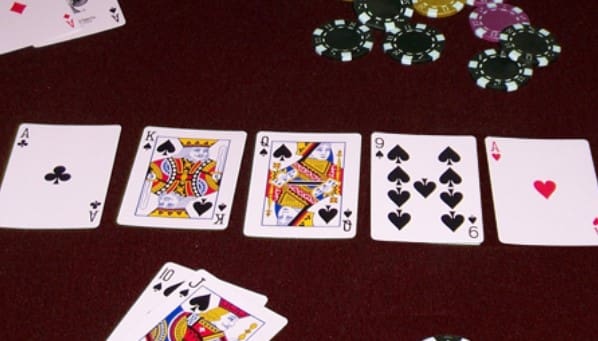For everyone who has attempted to play online, poker is needed for specific experiences. This sort of situation where someone appears to be too great in the sport, and someone is playing effortlessly but, in the end, still wins no matter what. Often, this scenario results in a conversation window filled with people complaining about something’s wrong with the sport, for it will not happen in the actual life of poker.
Is it true, though? Do the odds of internet poker games play out differently than they would with a real deck in the actual world? Or perhaps those players making the lucky draws are cheating. Many are tempted to pick on this last idea, figuring it is the best explanation of why they keep losing. Nobody ever wants to look at the idea that maybe they are not that great or that their luck has just come to an end.
Since online poker is just a poker game performed online where the players log on to their computers to take part in the game, rules, and moves done in the game will also be the same. Though one is done in real life and the other in the digital world, nothing changes the fact that both deal with poker, and they’ll follow the exact guidelines necessary for the game.
There are reasons, though, as to why there appear to be more bad beats when playing online. The major one is that more hands are being played. The speed of play in an internet poker room is generally double that of a match in the physical world. Plenty of the time, it’s more than that. You will see more hands in an hour of internet poker than you would have after a couple of hours at a casino.
Statistics show that an individual will end up a bad beat on the internet poker from ten hands playing. This demonstrates that online poker players are more vulnerable to bad moments. In contrast to playing in a casino where one bad beat an hour is likely to happen, having it online doubles or even triples the undesirable chance.
Bad beats are also inevitable on the internet because an increasing number of players themselves are eager to take the chance of losing. Some understand the danger already but decide to continue in the match, but some do not even know the risks they are getting involved in. They have to only be because playing online has less pressure than playing it in the actual world.
Poker rooms are proven to be costly; that’s why lots of people consider online poker a better choice thinking that it is riskier. The money they might spend on paying poker rooms alone may be an extra bet on the internet game.
There’s also the simple psychology behind this that makes people ready to believe they are being cheated. There are traders and physical and players cards at an actual poker table, and our brains can process this very readily. Online, though none of those things exist, so it’s easy to let ourselves believe items are not stacked fairly.
Online cheating has been documented, but it is impossible to rule out. If you are seeing unusual things at the table, chances are it is due to one of the factors mentioned above.
You must learn how to play poker, not only with the cards, but also through your opponent’s body language. Online poker makes it difficult to see the body language of your opponents.
Still, “informs” can be observed even if you’re playing poker online. This is because cells are the only ways that gamers betray their hands or their conclusions. In actuality, do you find that you see more action in a game of poker on the internet than in poker, which you play non-virtual? This is because there is sure to be a great deal more money and gambling involved.
Here are some tells you could watch out for when playing poker online.
1.)The stall – most inexperienced internet poker players, would do so when they have a solid hand. This is since they’re feigning ignorance about what to do to make their opponents call their increase. For experienced players, they make the most of this to pretend to have a solid hand. So young players will stall when they have a large needle; expert players will stall to fake it.
2.)The rant vs. the gloat- some players benefit from chat boxes to make it look like they are on a losing bet. Sometimes, it’s even correct. Some players break down under that pressure so that you can bully them a bit more to make them shed their matches. On the other hand, gloaters are immature players looking to make you believe they are stronger and more experienced, besides constantly getting good hands. Bluff them and see just how far they go, especially for those who have an excellent indicator.
3.)The all-knowing participant – This is the player who keeps on giving out unsolicited advice about the best way to play. Do not worry about these players; they generally escape your way before you even notice them.
There are other cells that you can learn how to differentiate as you continue playing online. The only thing you will need to do is try not to focus on yourself. This is to be sure that you’ve got ample time to observe other people’s tells.
When playing online poker, you might be unable to understand your opponents, but you can see what they do. The same as playing poker with your friends, people will reveal their characters whether you see them face to face.
Here are some behaviors that you should avoid:
1.) Chatting constantly. Whether you’re ranting or gloating, other players may have the ability to read between your lines and cause you to lose your strategy.
2.) Over-reacting. Don’t be so foolish as to tell everyone you’ve got a good hand or a bad hand by placing too much increase on the table or sending”emoticons” on the monitor.
3.) Rechecking your cards when a flush draw is flopped – write down your cards when you’ve got a bad memory. Rechecking your cards imply that you have a poor hand or a firm hand, and you’re silently gloating.
4.) Telling your opponents you’ve got a solid hand – they will understand that you probably have the weakest hand possible, so refrain from this bluff.
For yourself, you can avoid giving away your tells by not responding in any way perceivable to other competitions on the internet table.
The digital age has ushered in a new era of poker. From the tangible felted tables and clinking chips, we’ve transitioned to glowing screens and virtual tables. While this shift offers unparalleled convenience, it’s essential to recognize the nuances that come with online poker.
Let’s dissect this.
Imagine the traditional poker room’s hum – the slight tension in the air, players trying to read each other, catching that minute twitch or hesitation. In the online world, the setting changes. Although you don’t face your opponents directly, the game retains its human touch. Each mouse click, the length of a pause, or even a hastily typed chat message, can unveil a story. Grasping these ‘digital tells’ can be your ace in the hole.
However, online anonymity is a double-edged sword. Shielded by a screen, players often don more audacious personas, making bold moves they’d shy away from in person. While this audacity can open doors for strategic plays, it also injects unpredictability into the game.
Have you ever noticed a player juggling multiple tables? Multi-tabling, a phenomenon unique to online poker, can scatter a player’s focus. If you’re astute, this could be your chance. A distracted player might miss the forest for the trees, leaving gaps in their strategy for you to exploit.
Then there’s the allure of online tournaments. These digital coliseums draw vast hordes, from wily veterans to eager greenhorns, all chasing glory and sizable cash pots. Amidst this melee, adaptability is king. Early stages might see bold gambles, but remember: the true poker dance begins when the crowd thins.
While on the topic of online poker, it’s hard to sidestep the world of poker software and HUDs. These digital companions, with their plethora of statistics, are tempting. However, beware the siren’s song. Blending these tools with your gut feel can pave the way to success.
And before you lose yourself in the virtual shuffle, anchor yourself. Discipline is paramount. Your home might be your casino, but the stakes remain real. Chart out playing times, take deliberate pauses, and ensure every login is purpose-driven.
To wrap it up, online poker, with its quirks, is a fresh facet of a timeless gem. The essence? It’s still a dance of strategy, psychology, and skill. Adapt, embrace, and you might not just relish the play but also pocket its bounties.

